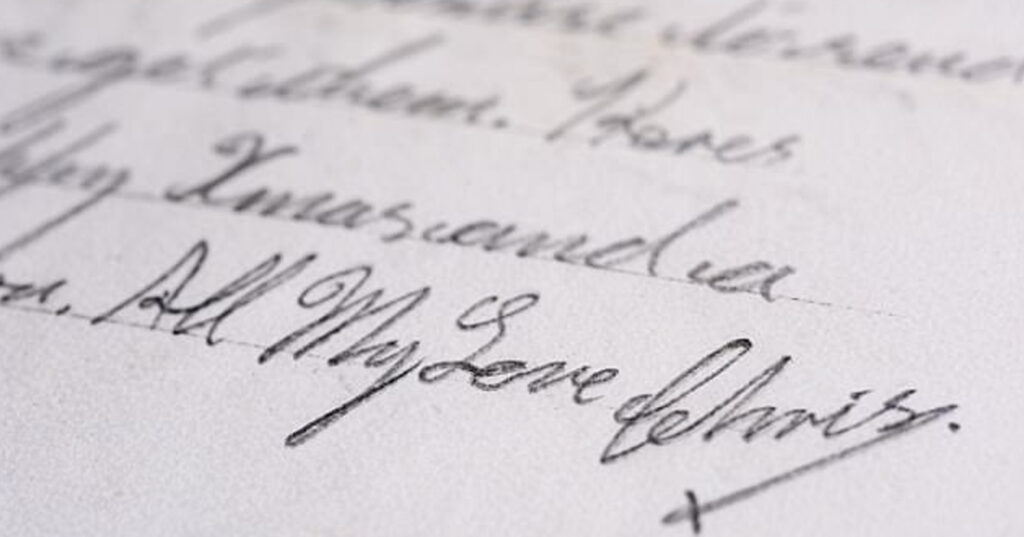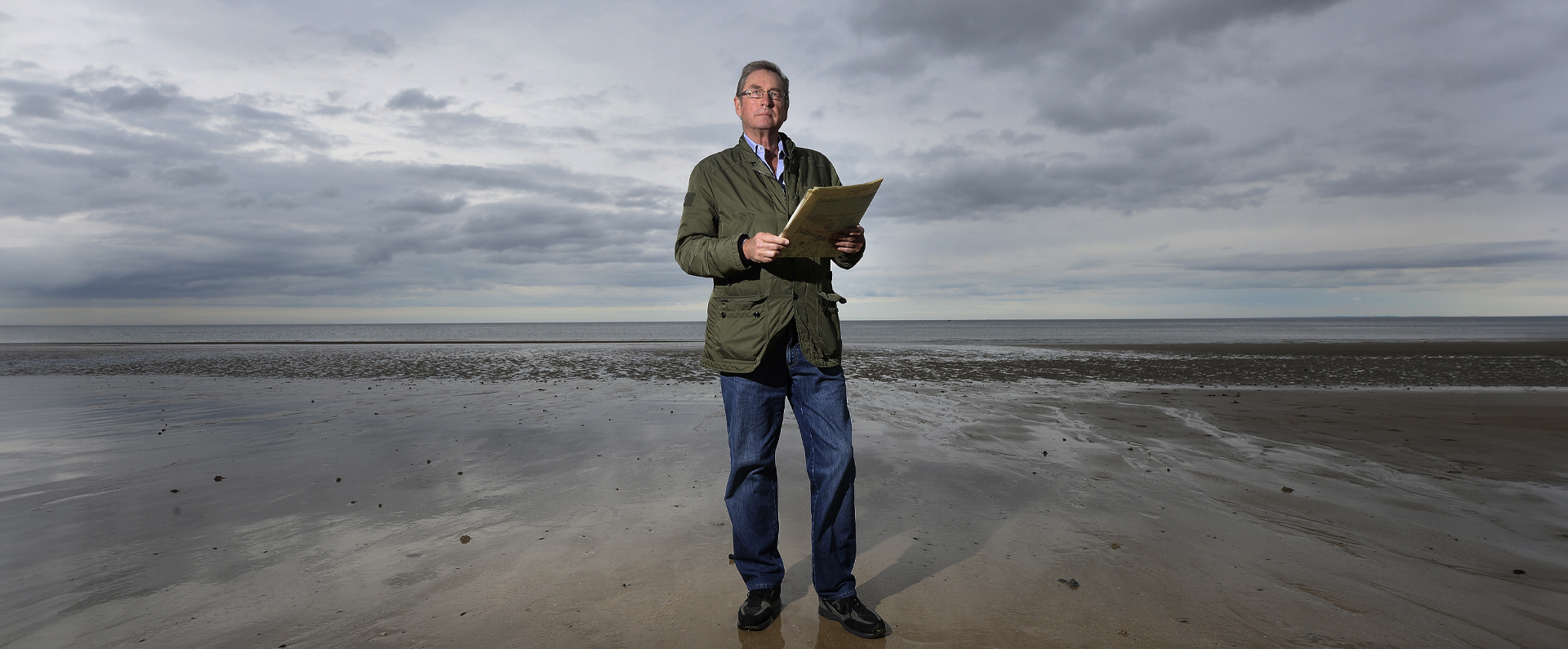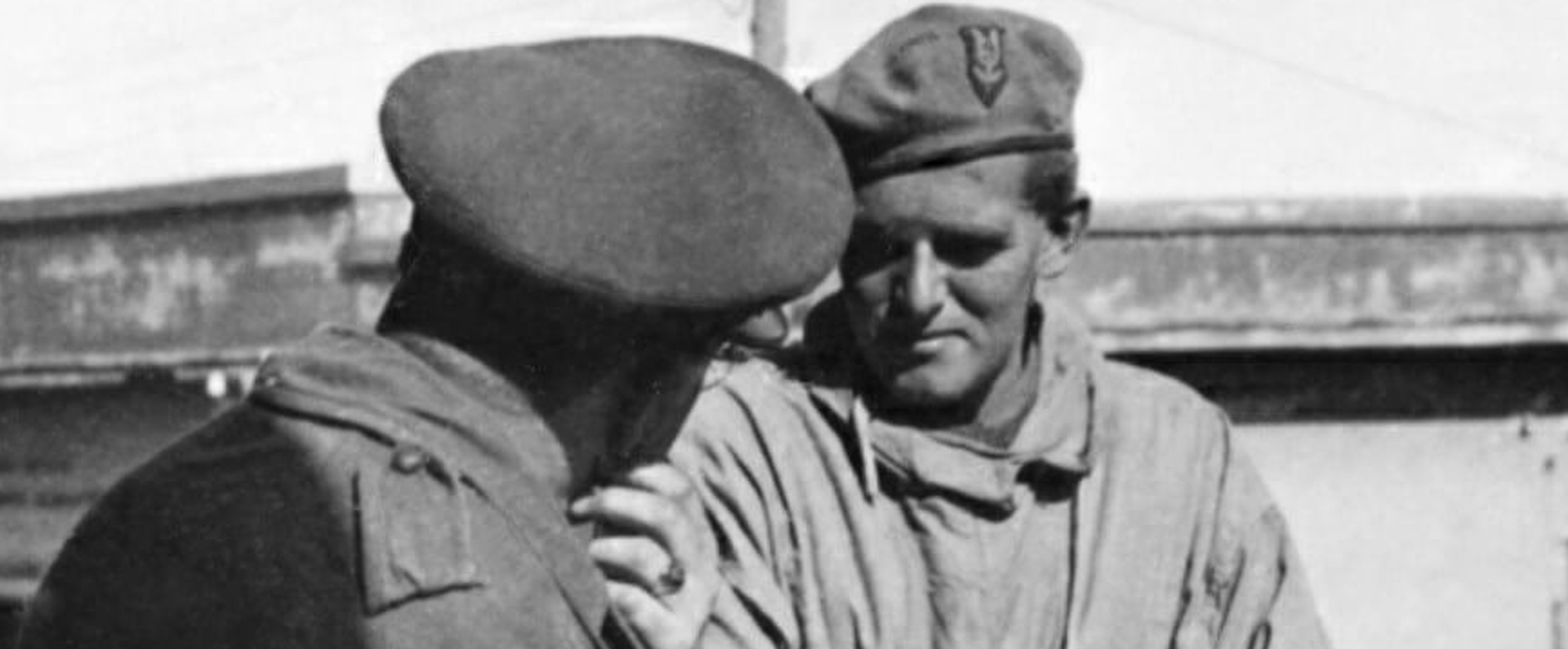
Published in the Daily Mail on 21 September 2017.
Private Christopher Maher
How WWII soldier whose family thought he had perished started writing to his best friend’s sister from a PoW camp – and went on to be her husband for 56 years.
His neat, hand-written letters are kept in a century-old wooden chest under a dressing table. Written using pen and paper obtained from his German prison guards, they provide a fascinating insight into a wartime romance between an heroic soldier who came back from the dead and his best friend’s sister.
Today Peggy Maher, the recipient of the letters and now a sprightly 94 years old, wipes away a tear as she recalls how the notes and post cards, all written more than 70 years ago, eventually led to a lifetime of happiness, once the British PoW who had penned them was finally released after nearly five years in captivity.
The full story of the extraordinary relationship between Private Chris Maher and the-then Peggy Hammond can be told for the first time today because, on a whim, she decided to write a short letter to the Daily Mail (Peterborough column, September 7 2017). I, in turn, was so moved by what I read that I decided to track her down and interview her in order to find out more details behind her intriguing four-paragraph letter.
Initially I had posted Peggy Maher’s letter on my Twitter account – I have more than 65,000 followers – and I soon found out that others were equally touched by its brief revelations. “That’s so lovely, thanks for posting,” tweeted one follower. “The last two sentences…hard not to get choked-up by that,” said another. “Awesome. True love. Timeless,” said a third person.
The letter to the Daily Mail revealed how Peggy Hammond had started writing to Private Maher, who was captured during the Dunkirk evacuation of 1940, at the request of her elder brother Jack, who was also serving King and country during the 1939-45 conflict with Nazi Germany.
After the Second World War ended, Private Maher came to thank her personally for writing to him when he was being held at some of the German’s most notorious PoW camps. Within a month of that meeting, the young couple, who had not seen each other for six years but who became close over their exchange of letters, were engaged.
However, I soon discovered there were many more twists and turns to the story than Peggy Maher’s short letter to this newspaper could disclose. Today I can reveal the full account of how a couple went from being family friends to sharing 56 years of their lives together. I feel humbled and privileged that Peggy Maher has permitted me to recount her remarkable tale.
…………………………….
Eva Peggy Hammond – always known as Peggy – was born in London’s City Hospital on June 15 1923. She was the third of four children of Jack Vickers-Hammond, a Savile Row tailor, and his wife, Florence. As she grew up, she had two older brothers, Jack Jnr and Sid, and a young sister, Miriam. The children were raised largely in Holborn and Baker Street before moving to Shepherd’s Bush when the war broke out in September 1939.
Jack Jnr’s best friend was Chris Maher, who was eight years older than Peggy. “I would only have been about one when he first started coming around to our home. He was like having another older brother. He was very sociable and he got on with everyone in the family,” she recalled.
In early 1939, just before the outbreak Second World War, Chris Maher, who had been an artisan glassmaker after leaving school at 14, enlisted into the Northamptonshire Regiment. By then, aged 23, 5 ft 7 ins tall and with fair red hair, he told his family and friends that he wanted “to see the world”. In the same year, Peggy, who had also left school at 14, was working as a teenage shop assistant in Selfridges, selling sewing machines.
Shortly after the beginning of the war, Private Maher was sent to France with his regiment and by late May 1940 he was part of the British force trying to enable the Dunkirk evacuations. Anyone who has seen director Christopher Nolan’s recent blockbuster film Dunkirk will know just how chaotic the scenes were in northern France from May 26 to June 4.
It later emerged that Private Maher’s unit had been ordered to stem the German advance but their senior officer was apparently so scared by the enemy’s relentless advance that he spent most of the time in his tent sobbing. The unit’s sergeant-major took over effective command but the situation looked grim and Private Maher’s close friend and comrade told him: “Come on, Chris. We are going to die here. Get your stuff and we will do a runner.” Private Maher replied: “That’s desertion. We will be shot. I am staying here to fight.”
As the Germans advanced, Private Maher and his fellow soldiers were ambushed by an enemy armoured motorbike and sidecar unit, armed with a machine-gun. When one of his comrades was shot dead, Private Maher removed his own jacket and put it over the dead man’s body out of respect.
However, Private Maher was wounded in battle just hours later and taken as a PoW. Before evacuating, British forces found the dead man along with Private Maher’s ID papers in the jacket covering his body. They concluded, perhaps understandably, that the dead man was Private Maher. The soldier was buried near where he had fallen and Private Maher’s parents, who by then lived in Sunningdale, Berkshire, were informed of their son’s “death”. A letter told them their son had been buried in a forest in northern France.
To this day Peggy has kept the letter informing Private Maher’s parents that he had been killed and she has also kept a letter of condolence from the King. On Buckingham Palace notepaper, George VI wrote: “The Queen and I offer you are heartfelt sympathy in your great sorrow. We pray that your country’s gratitude for a life so nobly given in its service may bring you some measure of consolation.”
Peggy, her two brothers and her parents were later also informed of Private Maher’s apparent demise. “We were all heartbroken, especially Jack. Chris was like part of the family. We were so sad,” Peggy recalled.
Yet, out of the blue, Private Maher’s parents were astonished but delighted to receive a post card from him, dated June 12 1940, saying he was being held as PoW. “Dear Mum and Dad. Just a p.c. [post card] hoping you are both well. I have been taken prisoner, also have been wounded, but am doing quite well. I am sorry you cannot write yet but as soon as I get my address I will let you know. Cheers.”
Although the post card was dated June 12 1940, it was some three months before it reached his parents’ home. However, word soon reached Peggy and her family too that Private Maher was alive, although being held as a PoW. “We were all overjoyed at the news,” she recalled.
When Peggy’s brothers Jack and Sid, who served respectively in North Africa and Italy, heard Private Maher was a PoW, they asked Peggy to contact him because she was always known as the “family’s letter-writer”. Peggy, then just 17, recalled: “My bothers were always very good to me – they looked after me – and so when they asked me to write to ‘poor Chris’, I said ‘Of course I will. Leave it to me’.”
It was in late 1940 that Peggy started writing to Private Maher and he soon replied. Over the next five years they exchanged scores of letters, however, some inevitably went astray in the wartime chaos.
The couple’s post cards and letters to each other started off being short, polite and formal. Furthermore, the letters were always censored, in both directions, by the German guards. Their correspondence slowly became more intimate and Private Maher ended his letter of March 1 1942 by asking his friend’s sister to send a photograph of herself because it would “help to cheer me”.
When she sent him a photograph, Private Maher – Prisoner No 37117 – replied to her in a postcard dated July 11 1942: “I received your photo thanks ever so much, you certainly have changed a great deal and I think I’ve have found the girl of my dreams at last.”
In a letter dated February 14, “– Valentine’s Day – Private Maher wrote saying: “I don’t think it will be very long now before it’s in the bag [the war ends]…”
“ I hope you enjoyed your Xmas as well as we did. Believe it or not, we were all tipsy. We made our own wine out of raisins extract: it was like gunpowder. Well Kid, you give my regards to all at home. We are now going to play football as this is Sunday and we all like to make the most of it, so cheerio for now. Write soon.”
Two weeks later, on February 28 1943, he wrote: “If a girl waits all this time for a chap, then she is a girl worth having…”
In a letter dated December 19 1943, he referred to his anguish at having to spend a third Christmas as a PoW. “Forgive the curses sweetheart, it drives me mad when I think of the times we could be having together,” he wrote.
During the war, Peggy Hammond worked in a munitions’ factory making limpet mines. She had a couple of short-term boyfriends but her main wartime passion was ballroom dancing. However, Private Maher’s predicament as a PoW was constantly on her mind. She told me: “As time passed, the letters became more affectionate but, of course, we never knew when the war would end.”
Private Maher was held at several different camps during nearly five years as a PoW: they included the notorious Stalag VIII B and Stalag 344.
During early 1944, Peggy did not hear from Private Maher for several months and she learnt much later that he had, in fact, escaped with some other PoWs. The men spent several days on the run in bitterly cold winter conditions as they tried to make for a safe house in the Balkans but Private Maher was eventually recaptured, brutally beaten up and kept in solitary confinement at a prison in Prague.
After his eventual release, Private Maher joked that he was “delighted” to be recaptured because he was so cold and hungry: he had spent part of his freedom in what was then Czechoslovakia, knee-deep in snow and without proper winter clothing, before seeking refuge in a church where he was betrayed by the local priest. Private Maher’s handwriting in his letters home became decidedly worse after mid 1944 as his health deteriorated and his weight dropped to just seven stone.
In a letter dated April 2 1944, Private Maher was – because his letters were censored – unable to reveal that he had escaped and been recaptured: “As you see we are back in [Stalag] VIII B. I’d love to tell you the reason for this changing around. But if I did this letter would not get through.”
In the same letter, he referred to the fact that Peggy’s 21st birthday was looming. “Remember Kid what I told you before, you are not forced to wait. I do not want to cause you any unhappiness by waiting for me. You already know my feelings towards you and I think yours go the same with me.” By now, all their letters were signed off with kisses.
As his health worsened, Private Maher spent several weeks in a prison hospital but, eventually, in late 1944 he discovered that he was due for release as part of an exchange scheme of sick prisoners, and he informed Peggy of the good news.
Peggy wrote to him on November 27 1944, as the Allies started getting the upper hand in the war and the Blitz was long over, saying: “London looks so lovely lately with all the lights on again, every day more and more lights go on, it looks so much like Christmas. When you come home, you won’t know what blacked out London looked like.”
Private Maher, then aged 29, was released in early 1945, some five months before VE Day (Victory in Europe Day) – May 8 1945 – that marked the end of fighting in Europe after Germany’s surrender.
Just days after VE Day and having already spent three months recovering in a British hospital, Private Maher, looking thin and frail, came to Peggy’s family home in Shepherd’s Bush, dressed in his demob suit, and he knocked on the front door. “I answered the door: it was the first time we had seen each other for more than six years. I gave him a hug. I had grown up and was no longer just his best mate’s kid sister. I think he had decided to snap me up!”
Just weeks later, on June 15 1945, Private Maher arrived on Peggy’s 22 birthday with an engagement ring. “He didn’t get down on one knee. He just said: ‘I have got you an engagement ring: how about getting married?’ He assumed I would say yes, and I did.”
“I liked Chris because he was always kind to me and he treated me well. He had a very good sense of humour and we would always be in fits of laughter together. He said his sense of humour helped him get through his difficult times as a PoW. He never moaned and our wedding day was the happiest day of my life,” Peggy said.
The couple had a church wedding in Shepherd’s Bush on September 8 1945 but the housing shortage was so acute in London after the war that they spent the first two years of their married life with Peggy’s parents and the next two living with Chris’s parents in Sunningdale. During this time, Chris was again working as an artisan and Peggy was desperately searching for their first marital home. Eventually, the couple were allocated their own two-bedroom rented council house in Egham Hill.
By this too time, the Chris and Peggy Maher were parents: their son, John – who proved to be the couple’s only child – was born on July 8, 1949.
Over the years, Chris Maher said little to his wife or son about his time in captivity but he did reveal that he was the only one from his unit to survive the enemy ambush during the Dunkirk evacuations, when he had fought to the last man.
However, his bravery was never officially recognised because of a lack of living eyewitnesses to his actions and, ever modest and understated, he never pursued a gallantry award upon his release as a PoW.
John Maher, a retired project manager, said: “Dad always joked that his good friend [name withheld] was treated like a hero, despite deserting his post, having got on a boat back from Dunkirk, whereas he [Chris Maher] stayed to fight, did his duty and ended up in a PoW camp for nearly five years. But he was never bitter about what had happened.”
Chris Maher also disclosed that, after escaping in early 1944, he had been put in a concentration camp for two weeks. His son said: “Dad said he was unable to sleep because of the constant screams. On one occasion, he saw in the distance logs being piled up and what looked like a row of bodies and then more rows of logs and more rows of bodies. He thought they were corpses but when the flames grew he could see people’s heads and arms moving. People [Jews] were being burned alive.”
John Maher said his father had told him that he got on well with most of his prison guards and some provided him with pens and pencils, along with post cards and paper, so he could write home.
“Chris had seen some horrible things and he wanted to try to forget about them,” Peggy told me. On one occasion, as a PoW, he had to clear up the charred remains of the bodies of Germans who had been killed in an Allied
bombing of an air-raid shelter.
For the most of their married life – from 1955 onwards – the couple lived in a two-bedroom council house in Watford, Hertfordshire, which they were able to buy, under the Tory Government’s “right-to-buy” initiative, in 1980. During this time, Chris worked as a welder and, later, a quality control inspector, until retiring aged 65. Peggy worked for much of her married life as a silver-service waitress.
Chris and Peggy Maher were eventually together for 56 years until his death, from lung cancer on Christmas Eve, 2001, two days after his 86th birthday.
“We were very lucky. We had a long and happy marriage, and we never really rowed about anything,” said Peggy, as she sat in her armchair, dressed in a pale green woollen jumper, dark green short-sleeve jacket and beige trousers.
Today she lives alone, with her ten-year-old Corgi-cross dog, Bobby, as her companion, while her son John, who is married with a stepson, lives just a mile away. She spends one morning a week helping out as a volunteer at Watford Hospice.
John Maher told me that he was delighted that the account of his parents’ wartime romance is now being told publicly for the first time. “It’s a lovely story, perhaps worthy of being made into a film,” he said.
Read this article on the DailyMail.co.uk
For more information, visit:
LordAshcroftOnBravery.com


